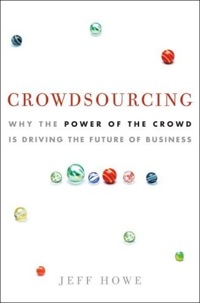 [Here’s the second response in this month’s Lab Book Club. We’re reading Crowdsourcing by Wired writer Jeff Howe; Rosita Boland from The Irish Times responds below to chapters 4 through 7. See here for more about the Lab Book Club. —Ed.]
[Here’s the second response in this month’s Lab Book Club. We’re reading Crowdsourcing by Wired writer Jeff Howe; Rosita Boland from The Irish Times responds below to chapters 4 through 7. See here for more about the Lab Book Club. —Ed.]
Something I thought about throughout this section was: Does an international perspective make a difference in how you look at crowdsourcing as a journalism tool? And if so, what are those differences?
Jeff Howe is American, writing about crowdsourcing in a country with a population of 300 million. My home country, the Republic of Ireland, has a population of four million. Is crowdsourcing about finding your community, no matter whether it ends up being large or small? Or how much does it have to do with the pool of people you start off with? And do different cultures respond differently to crowdsourcing, or are there key common themes no matter where in the world you may be?
The newspaper I write for, The Irish Times, was the first newspaper in Britain or Ireland to go online, back in 1994, and one of the 30 first papers in the world. Like many other papers, for quite some time, our online content resembled the layout of the actual paper. This may have had something to do with the large Irish diasporic community all over the world; the intention was to offer these long-time loyal readers a familiar experience that looked like the paper they read at home. Thus the news object itself created a community.
In Europe, we are struggling to recognize what appears to be becoming the norm at some American papers — that the reader is not merely a passive consumer, but also a potential participant in the form or content of the newspaper. Like any journalist who values quality, accuracy and transparency, I’m nervous about Michael Maness of Gannett’s declaration that “We really had to train our newsrooms to accept that they didn’t have a monopoly of ideas and opinions.” Where does experience fit into that statement? In our newsroom, we still have that monopoly, with little opportunity for readers to drive content — other than our letters pages, which receive a vast number of contributions and is probably the most read part of the paper.
Thus I was particularly interested in Howe’s analysis of what made readers respond to the efforts of Linda Parker, the “online communities editor” at The Cincinnati Enquirer. Trying to elicit stories from readers — and thus generate free, non-professional content — she first posted these words on the Enquirer site: “Be a citizen journalist.”
“Citizen journalism” is a term that has been kicked around a lot in Europe. It was effective during the London bombings, when rail commuters used their camera phones to capture images of the scene. Those images were picked up by both print and broadcast media, and it marked a dawning awareness that readers and viewers wanted to have some ownership of the content that made it into newspapers and broadcast media. It also scared some of us. We’re a highly unionized industry in Ireland and Britain, and membership in the National Union of Journalists is mandatory. Our press photographers don’t write stories, and writers don’t take photographs. Right now we’re uncertain about what these union rules will mean online. Will writers agree, for example, to shoot video and post pictures? What will happen to our photographer colleagues? These questions matter — particularly as Howe suggests that crowdsourced content, when applied to non-unionized newspapers, can provide either free or very cheap labor.
But what made Cincinnati readers reply to Linda Parker in huge numbers was not the invitation to “Be a Citizen Journalist” — which suggests the term may have already been regarded as outdated, even if the concept was not. Nor did “Tell Us Your Story” work any better. What worked were the words “Get Published.”
This resonated loudly with me. Ireland is a country where there sometimes seem to be as many creative-writing workshops as there are bars. Everyone wants to be a writer. It’s almost part of our culture. So how about a scenario where not everyone can be a writer, but everyone has the chance to get published in a newspaper? I am quite certain there would be a stampede if our newspaper invited stories from readers under that headline.
So we would then have what Howe calls a potential crowd. But what do we want from it, and how do we use it? I don’t yet know the answer to that. But I do know that what starts happening in America usually makes its way across the Atlantic sooner or later. Whether, as a journalist, you agree with what Jeff Howe is writing about in Crowdsourcing is, in a way, irrelevant. The fact is some of this is already happening, and it has implications for all print journalists, as newspapers across the world cut down on staff and lose resources.
Rosita Boland is a Nieman Fellow at Harvard and a reporter for The Irish Times.